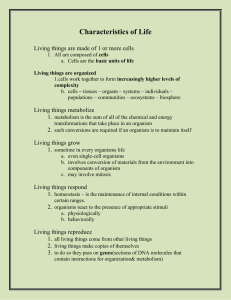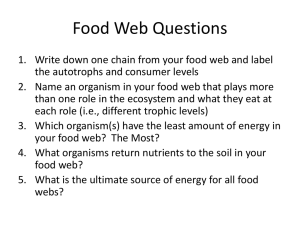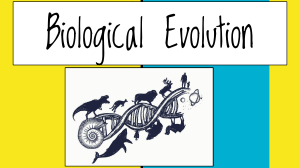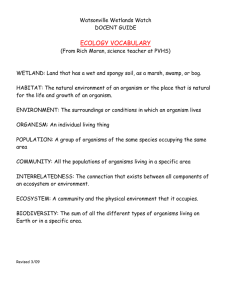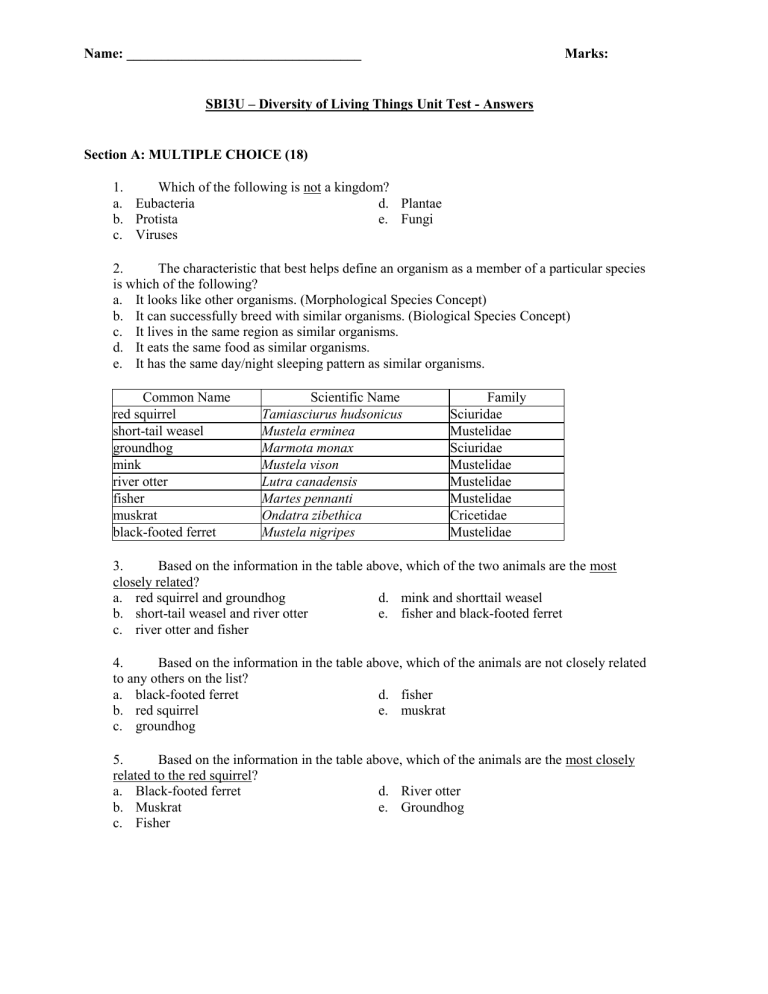
Name: __________________________________ Marks: SBI3U – Diversity of Living Things Unit Test - Answers Section A: MULTIPLE CHOICE (18) 1. Which of the following is not a kingdom? a. Eubacteria d. Plantae b. Protista e. Fungi c. Viruses 2. The characteristic that best helps define an organism as a member of a particular species is which of the following? a. It looks like other organisms. (Morphological Species Concept) b. It can successfully breed with similar organisms. (Biological Species Concept) c. It lives in the same region as similar organisms. d. It eats the same food as similar organisms. e. It has the same day/night sleeping pattern as similar organisms. Common Name red squirrel short-tail weasel groundhog mink river otter fisher muskrat black-footed ferret Scientific Name Tamiasciurus hudsonicus Mustela erminea Marmota monax Mustela vison Lutra canadensis Martes pennanti Ondatra zibethica Mustela nigripes Family Sciuridae Mustelidae Sciuridae Mustelidae Mustelidae Mustelidae Cricetidae Mustelidae 3. Based on the information in the table above, which of the two animals are the most closely related? a. red squirrel and groundhog d. mink and shorttail weasel b. short-tail weasel and river otter e. fisher and black-footed ferret c. river otter and fisher 4. Based on the information in the table above, which of the animals are not closely related to any others on the list? a. black-footed ferret d. fisher b. red squirrel e. muskrat c. groundhog 5. Based on the information in the table above, which of the animals are the most closely related to the red squirrel? a. Black-footed ferret d. River otter b. Muskrat e. Groundhog c. Fisher 6. Which of the following represents the correct stages of viral replication? a. synthesis, assembly, release, attachment b. assembly, release, attachment, synthesis c. release, attachment, synthesis, assembly d. attachment, synthesis, assembly, release e. none of the above 7. Which of the following statements concerning viruses and human health is false? a. b. c. d. e. In many diseases caused by viruses, the virus attacks cells as it reproduces. Most viral infections are difficult to treat but they can be finally destroyed by antibiotics. Some viruses can remain dormant in the body for years before disease symptoms appear. Oncogenic viruses can add genes to a cell and turn it into a cancer cell. Many viral diseases can be controlled through vaccinations. 8. Which of the following is not a characteristic of bacterial cells? a. b. c. d. e. they are prokaryotic and single celled contain no membrane-bound organelles have a single chromosome majority are pathogens (disease causing) reproduce asexually 9. a. b. c. d. Which statement best describes staphylococcus? Single, circular bacterium Circular bacterium clustered into groups Rod shaped bacterium clustered into groups Circular bacterium clustered in a straight line 10. A bacterial colony that is observed to survive and reproduce only when no air is around would be classified as which of the following? a. obligate aerobe d. facultative anaerobe b. obligate anaerobe e. none of the above c. facultative aerobe 11. Which of the following is not a characteristic of a member of the kingdom protista? a. are only heterotrophic d. most are microscopic and unicellular b. Have evolved more recently than bacteria e. are classified as eukaryotes c. have membrane-bound organelles 12. Which of the following is a similarity between plants and fungi? a. Both are eukaryotic. d. Both have cellulose in their cell walls. b. Both have one nucleus per cell. e. Both have major stores of starch. c. Both are autotrophs. 13. Fungi are vital to other organisms and to the proper functioning of ecosystems through their role as which of the following? a. producers b. carnivores c. Herbivores d. decomposers e. consumers 14. Which of the following is not a benefit fungi provide to humans? a. Yeast help make bread, wine, and beer. b. Penicillium produces antibiotic. c. trapping solar energy in photosynthesis produces more than half the worlds oxygen e. mushrooms, morels and truffles for food 15. Suppose a parasitic relationship exists between two organisms. This would mean which of the following? a. Both organisms are harmed. b. Both organisms benefit. c. One organism benefits and the other is harmed. d. One organism benefits and the other is unharmed. e. none of the above 16. Which of the following is not a characteristic of an organism in the animal kingdom? a. multicellular b. eukaryotic c. no cell wall d. are studied by zoologists e. are autotrophic Section B: TRUE OR FALSE (5) 1 Viruses are not represented in the six-kingdom system because they are considered non-living organisms 2 Fungi were once classified as members of the plant kingdom 3 Bees and flowers exhibit a mutualistic symbiotic relationship 4 Mosquitos feeding off the blood of humans is an example of a parasitic relationship 5 The arthropod phylum has the highest level of biodiversity of all animal phyla Section C: SHORT ANSWER 1. Why is classification important? (2) 2 a) Identify the 8 categories (taxa) for the classification of living things from the broadest to the most specific? (1) b) Two students were able to identify an organism to differing levels of classification. Student "A" was able to identify the organism to the level of "class." Student "B" was able to identify the organism to the level of "order". Which student has been able to classify the organism more accurately? Explain. (2) 3. Complete the following chart: (15) Bacteria Pro or Eukaryotic? Protist Fungus Are Organisms Single celled, multi celled or both? How are they helpful (Be specific) How may they be harmful? (Be specific) Sample organism? 4. Explain why plants spend so much of their limited energy to produce such elaborate / attractive flowers and fruits when they are actually taking away from the resources the plant has to keep its self alive.

